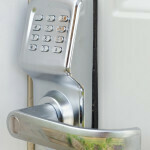Most of us, let’s admit; have locked ourselves out of our homes by the small measure of forgetting the keys inside. The small skewered device (key), lying stolidly in one of our pocket corners, often plays on our conscience. It’s time to say goodbye to the key as we enter the gorgeous world of keyless and wireless locks, reports Krissy Rushing for the website Technology Tell.
The problem with mechanical keys
The mechanical keys have one problem; they are mechanical. Their relevant locks are ever vulnerable of being broken by burglars and psychos. With the wireless locks, we turn security into the hands of an online controller (most likely our Smartphone).
 This gives us enormous leeway. We can keep checking the status of the lock from far off (this is especially great for OCD sufferers).
This gives us enormous leeway. We can keep checking the status of the lock from far off (this is especially great for OCD sufferers).
Backups for Wireless Locks
Rushing states in her stark humour that the intruder first needs to locate your home before breaking into it. Thus, you are on safe waters even if your Smartphone goes a-begging (or is stolen), as most likely it will be secured by passwords (it ought to be if it’s not).
Wireless locks provide you with additional options to unlock your door. You can reach the algorithm by inserting PIN on the keypad or through online accounts accessed from others’ phones.
The frontrunners for wireless locks
Yale and Kwikset are the frontrunners in the key-and-lock terrain offering you admirable facilities (bump guards, jumpers). The price is affordable ranging from $199 to $275; quite reasonable when you consider in the light of the security they provide.
Be aware about battery status
You need to be on your toes and read the warning signals that the wireless locks flare you with when the battery begins breathing incoherently. Generally, you get the warning 30-day in advance, giving you sufficient time to make a replacement.
Also, employ strong encryption for the home router (they are the first targets for any serial hacker).
Wireless locks also offer you a sense of elegance and are extremely easy and chic on the eyes. Kevo from Kwikset is an enlightening example in this regard.
You can read the original article here.
In my opinion, although wireless locks are way more secure than mechanical locks, they demand much over-stretched attention. If you get the keypad installed, you will ever live in fear of someone else trying his/her hands for the PIN.
Then again, whatever said, this system is not foolproof against hackers who have a number of ways to crack your Smartphone’s password if it gets locked into their hands.
Charm of mechanical locks
The charm of mechanical locks has ever been their sense of simplicity: they are not broken into unless someone gets aggressive (that can be adventurous and is beset with the fear of catching the neighbour’s or by-passer’s eye). Wireless locks, meanwhile, open like a buttered primrose when the code is cracked and you would hardly know what hit you.
There also is the additional problem of forgetting your own PIN; a dangerous prospect if your phone gets stolen or dead.
What security backups should wireless locks have in case your Smartphone gets stolen or the lock battery turns up dead?

